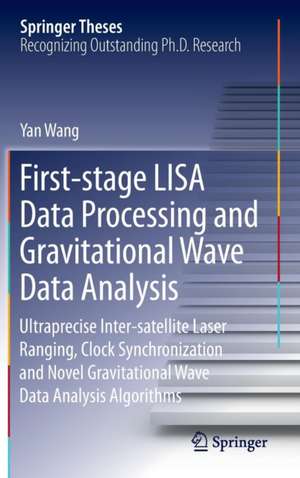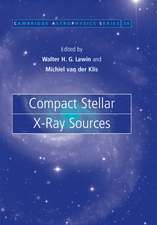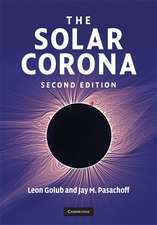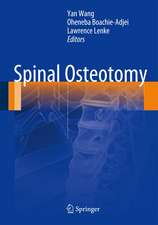First-stage LISA Data Processing and Gravitational Wave Data Analysis: Ultraprecise Inter-satellite Laser Ranging, Clock Synchronization and Novel Gravitational Wave Data Analysis Algorithms: Springer Theses
Autor Yan Wangen Limba Engleză Hardback – 18 dec 2015
The thesis concludes with some topics related to the eLISA such as a new class of phenomenological waveforms for extreme mass-ratio inspiral sources (EMRIs, one of the main source for eLISA), an octahedral space-based GW detector that does not require drag-free test masses, and some efficient template-search algorithms for the case of relatively high SNR signals.
| Toate formatele și edițiile | Preț | Express |
|---|---|---|
| Paperback (1) | 638.57 lei 43-57 zile | |
| Springer International Publishing – 29 mar 2019 | 638.57 lei 43-57 zile | |
| Hardback (1) | 644.82 lei 43-57 zile | |
| Springer International Publishing – 18 dec 2015 | 644.82 lei 43-57 zile |
Din seria Springer Theses
- 18%
 Preț: 997.88 lei
Preț: 997.88 lei -
 Preț: 389.88 lei
Preț: 389.88 lei - 15%
 Preț: 646.94 lei
Preț: 646.94 lei - 18%
 Preț: 943.43 lei
Preț: 943.43 lei -
 Preț: 399.29 lei
Preț: 399.29 lei - 18%
 Preț: 944.99 lei
Preț: 944.99 lei - 15%
 Preț: 636.80 lei
Preț: 636.80 lei - 18%
 Preț: 941.05 lei
Preț: 941.05 lei - 15%
 Preț: 643.16 lei
Preț: 643.16 lei - 15%
 Preț: 642.68 lei
Preț: 642.68 lei - 18%
 Preț: 1103.62 lei
Preț: 1103.62 lei - 20%
 Preț: 558.83 lei
Preț: 558.83 lei - 18%
 Preț: 1112.30 lei
Preț: 1112.30 lei - 18%
 Preț: 944.19 lei
Preț: 944.19 lei - 18%
 Preț: 1109.92 lei
Preț: 1109.92 lei - 18%
 Preț: 1217.27 lei
Preț: 1217.27 lei - 15%
 Preț: 640.06 lei
Preț: 640.06 lei - 15%
 Preț: 636.45 lei
Preț: 636.45 lei - 15%
 Preț: 640.06 lei
Preț: 640.06 lei - 15%
 Preț: 640.88 lei
Preț: 640.88 lei -
 Preț: 389.70 lei
Preț: 389.70 lei - 20%
 Preț: 563.91 lei
Preț: 563.91 lei -
 Preț: 393.35 lei
Preț: 393.35 lei - 15%
 Preț: 637.93 lei
Preț: 637.93 lei - 15%
 Preț: 641.85 lei
Preț: 641.85 lei - 18%
 Preț: 1225.94 lei
Preț: 1225.94 lei - 20%
 Preț: 551.36 lei
Preț: 551.36 lei - 18%
 Preț: 1229.10 lei
Preț: 1229.10 lei - 15%
 Preț: 639.25 lei
Preț: 639.25 lei - 18%
 Preț: 999.45 lei
Preț: 999.45 lei - 15%
 Preț: 640.06 lei
Preț: 640.06 lei - 18%
 Preț: 1220.45 lei
Preț: 1220.45 lei - 18%
 Preț: 1116.26 lei
Preț: 1116.26 lei - 18%
 Preț: 1110.72 lei
Preț: 1110.72 lei - 18%
 Preț: 1000.87 lei
Preț: 1000.87 lei - 18%
 Preț: 891.17 lei
Preț: 891.17 lei - 15%
 Preț: 640.06 lei
Preț: 640.06 lei - 5%
 Preț: 1154.07 lei
Preț: 1154.07 lei - 15%
 Preț: 635.96 lei
Preț: 635.96 lei - 15%
 Preț: 640.88 lei
Preț: 640.88 lei -
 Preț: 387.20 lei
Preț: 387.20 lei - 18%
 Preț: 1109.92 lei
Preț: 1109.92 lei -
 Preț: 385.25 lei
Preț: 385.25 lei -
 Preț: 385.25 lei
Preț: 385.25 lei - 18%
 Preț: 1112.30 lei
Preț: 1112.30 lei - 18%
 Preț: 999.45 lei
Preț: 999.45 lei -
 Preț: 386.99 lei
Preț: 386.99 lei - 15%
 Preț: 637.13 lei
Preț: 637.13 lei - 20%
 Preț: 554.21 lei
Preț: 554.21 lei - 20%
 Preț: 555.59 lei
Preț: 555.59 lei
Preț: 644.82 lei
Preț vechi: 758.60 lei
-15% Nou
Puncte Express: 967
Preț estimativ în valută:
123.43€ • 134.11$ • 103.74£
123.43€ • 134.11$ • 103.74£
Carte tipărită la comandă
Livrare economică 21 aprilie-05 mai
Preluare comenzi: 021 569.72.76
Specificații
ISBN-13: 9783319263885
ISBN-10: 3319263889
Pagini: 228
Ilustrații: XXX, 228 p. 97 illus., 1 illus. in color.
Dimensiuni: 155 x 235 x 16 mm
Greutate: 0.54 kg
Ediția:1st ed. 2016
Editura: Springer International Publishing
Colecția Springer
Seria Springer Theses
Locul publicării:Cham, Switzerland
ISBN-10: 3319263889
Pagini: 228
Ilustrații: XXX, 228 p. 97 illus., 1 illus. in color.
Dimensiuni: 155 x 235 x 16 mm
Greutate: 0.54 kg
Ediția:1st ed. 2016
Editura: Springer International Publishing
Colecția Springer
Seria Springer Theses
Locul publicării:Cham, Switzerland
Public țintă
ResearchCuprins
Introduction.- LISA data processing chain.- Applying the Kalman filter to a simple case.- The inter-spacecraft measurements.- Design a hybrid extended Kalman filter for the entire LISA constellation.- Alternative Kalman filter models.- Broken laser links and robustness.- Optimal filtering for LISA with effective system models.- Clock noise and disordered measurements.- Octahedron configuration for a displacement noise-canceling gravitational wave detector in space.- EMRI data analysis with a phenomenological waveform.- Fast detection and automatic parameter estimation of a gravitational wave signal with a novel method.- Likelihood transform: making optimization and parameter estimation easier.
Notă biografică
Yan Wang received his Ph.D. in 2009 at Albert-Einstein-Institut Hannover (Max-Planck-Institut fuer Gravitationsphysik). Since 11/2014 he has been working as research assistant professor, School of Physics, University of Western Australia. He's the winner of the 2014 Stefano Braccini Thesis Prize awarded by the Gravitational Wave International Committee.
Textul de pe ultima copertă
This thesis covers a diverse set of topics related to space-based gravitational wave detectors such as the Laser Interferometer Space Antenna (LISA). The core of the thesis is devoted to the preprocessing of the interferometric link data for a LISA constellation, specifically developing optimal Kalman filters to reduce arm length noise due to clock noise. The approach is to apply Kalman filters of increasing complexity to make optimal estimates of relevant quantities such as constellation arm length, relative clock drift, and Doppler frequencies based on the available measurement data. Depending on the complexity of the filter and the simulated data, these Kalman filter estimates can provide up to a few orders of magnitude improvement over simpler estimators. While the basic concept of the LISA measurement (Time Delay Interferometry) was worked out some time ago, this work brings a level of rigor to the processing of the constellation-level data products.
The thesis concludes with some topics related to the eLISA such as a new class of phenomenological waveforms for extreme mass-ratio inspiral sources (EMRIs, one of the main source for eLISA), an octahedral space-based GW detector that does not require drag-free test masses, and some efficient template-search algorithms for the case of relatively high SNR signals.
The thesis concludes with some topics related to the eLISA such as a new class of phenomenological waveforms for extreme mass-ratio inspiral sources (EMRIs, one of the main source for eLISA), an octahedral space-based GW detector that does not require drag-free test masses, and some efficient template-search algorithms for the case of relatively high SNR signals.
Caracteristici
Nominated as an outstanding Ph.D. thesis by the Gravitational Wave International Committee Won the 2014 Stefano Braccini Thesis Prize awarded by the Gravitational Wave International Committee Selected as the most novel and innovative thesis in the field of gravitational wave physics in 2014 Includes supplementary material: sn.pub/extras














